Tate no Yuusha no Nariagari
Short Synopsis: A college student is transported to another world, where he must train to defend a medieval kingdom with nothing but an enchanted shield.
Lenlo’s Review:
For the required Isekai of the season, it’s surprisingly not a terrible fare. Shield Hero surprised me by taking the general premise where the Isekai Hero starts OP and above everyone else and throws it out the window. I like that our hero has to work from the bottom, with the potential for power in the sword, but clear deficiencies in combat and being behind everyone else in terms of gear, money and respect. He basically has to be a tank. So long as Shield Hero doesn’t try to turn him into some combat badass and keeps him in the support role, the unflappable tank who only sets up the win for other characters, I think I could really enjoy this. To address the Animal Girl in the room though, I am not inherently against the slavery aspect. The hero is already at the bottom rung of society, so he can no doubt relate and connect to the slaves. That’s basically what he is with these “Waves”. So I think the slavery aspect could make for some interesting character relationships. What bothers me is that the first/main companion/slave is an animal girl that will no doubt eventually fall for him, ala Stockholm Syndrome. I think that is an icky, creepy relationship to focus and build on and I really hope Shield Hero has more restraint than that. We will have to wait and see. Finally, visually, Shield Hero isn’t anything special. There is some smooth motion when fighting the balloon monsters, but we have yet to reach any kind of set piece. So I would call it average in this department so far. Regardless, it has my interest enough that I am gonna keep up with it for at least a few more weeks.
Potential: 45%
Mario’s review:
Why do these isekai anime love game mechanics so much? Everytime these game mechanics spelled out, they basically lost me. “Status options” on the screen; level up? For most of Tate double-length premiere it runs as a typical isekai, and that’s exactly the point because up to half-an-hour mark the show reveals its hands. It’s a good thing that our protagonist hits rock bottom and we see how he eventually becomes cynical. Has to gain the power, respect and even companion himself without any “cheat” is always a welcome. What worries me however is the end. Not necessary about the “slavery’ aspect, but more that it’s still self-fulfilling in the end: he still gets a comrade who happens to be bloody hot (demi) girl. So what makes or breaks a show is how well it makes him suffer because the more he goes through some real drama the more earned his efforts will be. Visually it doesn’t impress me but knowing this is from Kinema Citrus I have my full trust. I’m also worried that characters can fall into common tropes since aside from our titular characters, the others are quite stock characters. Considered that was the point before the “twist”, we will have to see how well-developed of this new girl in the next episode.
Potential: 30%
Ueno-san wa Bukiyou
Short Synopsis: A genius schoolgirl attempts to attract her clubmate’s interest via lewd inventions and situations.
Lenlo’s Review:
The only short I have really finished to completion was last season’s Honda-san. And even then, I found myself not all that enthused by it at the end. That puts Ueno-san already at a disadvantage, because I find it visually and thematically inferior to Honda-san in every way. The topic of a middle-schooler trying to get a boys attention is dull, the dialogue is dull, the visuals are washed out. At least Honda-san had an interesting style, it generated colorful and engaging screens, even if they didn’t move much. Ueno-san though is just… dull. I keep saying that word, but it’s the best way to describe it. It took me 30 minutes to finish a 10 minute short because I had to force myself through it. Suffice to say, this is a hard pass for me.
Potential: 0%
Wooper’s review:
I’m a fan of half-length anime comedies, but given how cheaply produced and one-note they tend to be, what counts the most is often their subject matter. In Ueno-san’s case, we’re dealing with a girl who wants a boy to notice her, but can’t think of a way to attract his attention apart from using him as a guinea pig in her perverted science experiments. This isn’t a bad premise in isolation, but the series is so invested in the shy, unable-to-confess -dere trope that it dominates the proceedings. Ueno-san’s inability to tell her crush that she likes him doesn’t offer any commentary on young love beyond, “It’s hard to admit that you like somebody.” Her red twintails and white-pupiled eyes make for an attention-grabbing design (the one redeeming feature of this episode), and if the ED is any indication, plenty more girls will be introduced in the coming weeks. If that’s your bag, Ueno-san might be worth 11 minutes every week, but based on this premiere, it isn’t worth mine.
Potential: 10%
Pastel Memories
Short Synopsis: Four girls working in a manga cafe try to find a collection of lost manga.
Lenlo’s Review:
Pastel Memories managed to successfully draw me in, get me interested, and then lose me completely all within the same episode. I was all for the fluffy concept of bringing back Otaku culture one series at a time. Scouring a dead series or genre to bring it back, because it meant something special to someone. That is an interesting, episodic concept to me and gives them a lot of freedom to play around with. They could animate different or present each story differently, in the style of the manga or series they are hunting down that week. But then at the end they randomly become magical girls fighting some virus? And this virus is no doubt responsible for the death of Otaku culture no doubt I am sure. It’s like a completely different show and it confuses the shit out of me. Not to mention that this supposedly failing cafe run by children somehow has enough revenue to not only support 10 employees, but to have them running around looking for manga all day. Pastel Memories had the base for a fun, wholesome, episodic series about Otaku culture and proceeded to completely ignore it for the lowest common denominator magical girl tripe. Color me surprised with a healthy dose of pastel, cause I am done and not coming back.
Potential: 0%
Mario’s review:
It’s another anime set in Akihabara that aims squarely on the otaku culture. While I can safely say that I’m not within the target audience, the very concept of reviving a lost culture is an interesting one for me. So the part where the team searches for the full collection of the manga works well enough for me. Sadly though, I’m never sold on the setting itself. The cast works in an otaku cafe where they hardly have any customer, but I counted like 10 people working there. There isn’t a clear time set (how many years since it loses its fandom?), and I find it strange that these manga stores don’t have some sort of network before. But the most head-scratching part comes down at the end, where supposedly the girls have to go the another dimension to destroy virus? Where the heck does that part come from? It feels like another show entirely. It’s jarring no matter how you look at it.
Potential: 10%

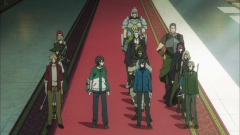
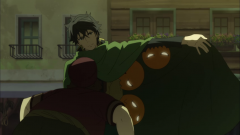
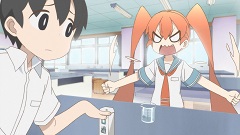
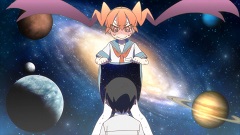
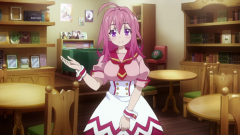
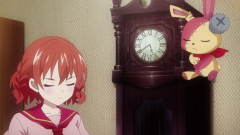
Shield Hero’s weakness doesn’t get me because we all know he will be the eventual solution for defeating the big bad at the end due to having some OP protect skills that will block the enemy’s big mega attack which would otherwise wreck the kingdom and we also know how everyone will realise what a great guy he is at that point and that they were just overlooking him because other people are evil.
These banes are always just some intro gimmick to make a battle shounen or isekai feel different, just like the slime guy who stopped being a slime around episode 6 or so.
Also, nobody who ever played a game ( = the three other guys for example) would ever consider a tank in the group as useless. Can’t tell if it’s a genuinely forced plot point to turn MC into a poor victim or if the author has actually never played a RPG himself.
To be fair, the title literally is “The *Rising* of the Shield Hero”, so the author is pretty transparent about his intentions. Personally I don’t mind if Naofumi gets strong eventually: if they’re executed well, zero-to-hero stories can be a lot of fun. And him being a shield hero, which comes with some pretty major restraints, is a fun twist. It means he’ll have to find his own path to strength, using unconventional methods and team work, which could be a nice change of pace.
I also think it’s a bit too early to argue that the disdain others seem to hold the shield hero in doesn’t make sense. As an anime only I don’t know the reasons myself, but according to LN readers we will later find out the reason why Naofumi is treated in this way. Also note that Naofumi isn’t *just* a tank. It’s not just that his legendary weapon is a shield: he can’t use any other weapon! And that means he can hardly level up etc etc. Plus, the other three guys explicitly said that in their games the shield hero class was “for losers”, because you couldn’t go far with it. I’ll admit that is a bit strange (who would design their game that way?), but if we’re being charitable it could be a good class for beginners or something.
I’ll admit the setting is incredibly dull though. Game worlds are used way too often, and the villains seem utterly one-dimensional so far. But I personally watch isekai mostly for their entertainment value, and Shield Hero does pretty well for me so far in that regard.
By the way, why does almost no one mention the Kevin Penkins OST? Maybe it’s because I watched the episode with headphones, but his music was immediately recognizable to me, and it made the episode a lot more enjoyable than it could have been. If I’ll end up watching the series to the end, his music will probably be one of the major reasons.
Maybe it’s because I watched the episode with headphones, but his music was immediately recognizable to me, and it made the episode a lot more enjoyable than it could have been. If I’ll end up watching the series to the end, his music will probably be one of the major reasons.
I’m glad there was no politicking in your first impressions though. On ANN their previews are almost entirely dominated by it. That “liberal intolerance” towards viewpoints even just slightly different from their own is really tiring. I quite like politics, and I share their liberal sentiments, but why let it monopolize your viewing experience?
ANN is always very… political, yeah. Im not a huge fan of that to be honest. I find that it can ruin an otherwise good series, and to be frank, their idea that you can’t have a taboo subject presented in an anime is ridiculous. Once you start restricting it like that, you lose the ability to comment on it in media.
To be fair to ANN, they do think you can show a taboo subject in an anime, but you have to do it *exactly* how they want it. For example: you can have a rape scene, but then you have to discuss its traumatic implications for the victims as well. You can have a fake rape accusation, but then you have to make it clear that sexual violence by men is a way bigger problem. You can have a gay romance (in fact, they love that), but you carefully have to avoid all the tropes they find objectionable, and you’ll have to balance treating them no different from straight couples (because gay people are just regular folk!), and giving them special treatment (they’re oppressed after all!). So you can comment on controversial issues, but you’ll have to do it with a lot of care and nuance – and in a way that fits their world view, of course.
To a certain extent, I can agree with this: if a series presents a controversial topic with grace, nuance and humanity, that certainly speaks in its favor. But what annoys me about ANN is (i) how utterly obsessed they are with this, to the point where they’re actively pushing their own views on their readers and reject series solely because they don’t fit their ideology, and (ii) how selective their indignation is, basically reflecting the culture wars raging in the US. Gays, transgender folk or women aren’t properly represented? Go get the pitch forks! But if other, less “oppressed” groups are presented in simplistic ways, they barely seem to care. For example, how often are men presented as sex obsessed idiots, or savages who crave violence? How often is straight romance reduced to a couple of dumb tropes that barely resemble real life? How often is violence glorified as something that’s necessary to rid the world of evil? And so on. What should matter is whether a series has good writing. Focusing on a bunch of issues that dominate the culture wars seems narrow-minded to me, and their “moralizing” attitude to minority representation can be quite irritating even to someone who largely shares their views.
*End of rant ;)*
I agree, what bugs me the most is ANN projecting Western social issues onto a work made in another part of the world.
Personally I am long tired of such Politicking. Both talking and arguing about it. In anything I write I generally try to avoid that unless I have to. I just don’t see the point of using an anime to soapbox about issue any person already knows about.
I think you guys are smart enough to know that rape and slavery are bad M’kay?
Huh, is there a limit on the reply chain? I wanted to reply to Lenlo, but there’s no such option. Oh well, guess I’ll just reply to myself then.
But yeah, there’s that too. Calling a story development written six years ago (and that’s not counting the web novel) in another part of the world tone deaf because it doesn’t take account of liberal sensibilities in the West does seem a bit self-absorbed.
@Aidan: looking critically at the themes of a series can be quite interesting imo, in moderation. But I agree having a reviewer push his politics on readers can feel very patronizing.
Not only ANN, read this post from anime feminist https://www.animefeminist.com/review-the-rising-of-the-shield-hero-episode-1/
I know those false rape accusation and slavery could be a sensitive issues. Heck I do care about them irl but in this very context I don’t find them offensive at all. As Animosh rants below, they do have the point of going politics but sometimes being to aggressive limits you from acknowledging other aspects of the show.
Well, at least with a website called “animefeminist” you know what to expect: that ANN (which supposedly targets all anime fans) is so dominated by reviewers who strongly advocate their politics to their readers is more surprising. But yeah, a lot of outrage over an episode that didn’t seem all that offensive to me. I’ll admit there’s some otaku pandering with its “the whole world is against me”-mentality. But that’s just bad writing. It doesn’t mean its author endorses rape and slavery. Or is an “incel” who hates all women.
Yeah not a fan of politizing fiction either. There might be cases where I actually do this but they’re extremely rare and the series where I do this must be extremely blatantly political themselves otherwise it’s just fiction to me. I mean I would like to see some dictator as MC for once, doesn’t mean I approve of what he does. It’s just interesting witnessing a story from a different PoV for once and see different power dynamics or chances for character development.
Also completely forgot about Penkins. I must admit that I barely noticed him, it was more extreme in MiA and Starlight for me. But I guess the best tracks are yet to come.
Wait, was Penkins involved in Revue Starlight? I can’t find that anywhere. But I agree MiA’s OST was more memorable from the start: especially in the first half of this premiere the OST, though solid, wasn’t very noticeable. The second half did have some tracks that I thought gave off a clear Penkins-vibe though, like the violin music in the throne room. I particularly liked that melancholy track that played when Naofumi was collecting the leaves: it had this somber but hopeful tone that fits the series really well.